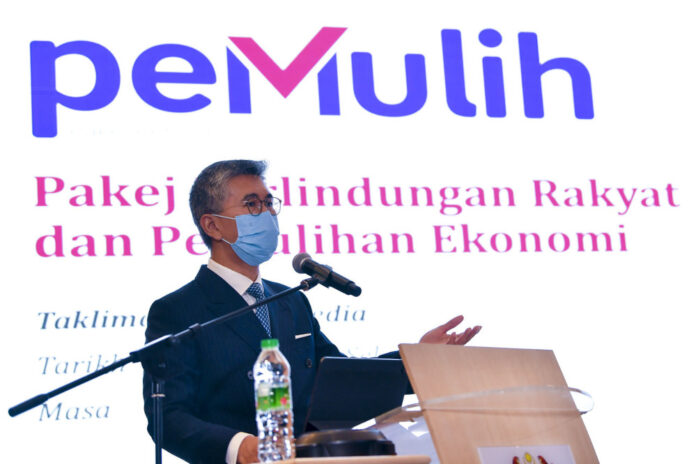Finance Minister Datuk Seri Tengku Zafrul Abdul Aziz speaks at a press conference on the National People’s Well-Being and Economic Recovery Package (Pemulih) in Putrajaya, June 29, 2021. — Bernama pic
KUALA LUMPUR, Dec 12 — The financial assistance under the National People’s Well-Being and Economic Recovery Package (Pemulih), which will end on Dec 31, 2021, has helped Malaysian citizens protect their livelihoods during the Covid-19 pandemic.
In late-June this year, the government launched the Pemulih package worth RM150 billion, which included financial assistance to support businesses, individuals, families and increasing the vaccination rate in the country.
Under the Pemulih package, the Special Covid Aid or Bantuan Khas Covid-19 (BKC) worth a total of RM4.6 billion, will help senior citizens, single people and 11 million households.
Manager of business development of Putra Business School (PBS), Assoc-Prof Ahmed Razman Abdul Latiff said even though the Pemulih package will end by this month, the effort to provide comprehensive assistance to the people will continue next year through initiatives announced under Budget 2022.
For example, he said Bantuan Keluarga Malaysia will replace Bantuan Prihatin Rakyat with a bigger allocation and covering more recipients.
The positive impact from Pemulih package can be seen this year through the gradual improvement on the national’s gross domestic product (GDP) and lower unemployment rate among others.
“Budget 2022 initiatives will ensure that the recovery process will continue next year and those affected individuals and groups will continue to receive assistance via various measures announced in the budget,” he told Bernama.
Meanwhile, Bank Islam Malaysia Bhd chief economist Mohd Afzanizam Abdul Rashid said Bank Negara Malaysia has announced the Financial Management and Resilience Programme (URUS) in October this year whereby the programme will help the B50 household borrowers or customers to alleviate the financing difficulties due to the Covid-19 pandemic.
He said URUS is a more personalised programme, which involves interest or profit waiver for three months, deferred payments or reducing the installments alongside with advisory services that aims to build financial assistance.
This programme will be spearheaded by the Credit Counselling and Debt Management Agency (AKPK) with the collaboration of the banking institution in Malaysia.
In that sense, Afzanizam said the assistance is an ongoing affair and will be targeted.
Will it help the economy? Certainly.
“The programme will help borrowers or customers by providing some breathing space and to regain financial resilience as the economy gradually recovers.
“What matters now is that the affected borrowers or customers would need to engage with their respective financiers in order to craft a more personalised financial assistance that suits the uniqueness of everyone’s financial predicament,” he said.
Applications for URUS run from Nov 15 to Jan 31, 2022.
SME Association of Malaysia, on the other hand, said the financial assistance under Pemulih package must continue as the Malaysian economy has not yet recovered while Health Minister Khairy Jamaluddin noted that it is impossible to have another lockdown.
“It means that we will face more problems. The government has anticipated that we have not recovered so soon, hence we need the assistance to boost our economy,” said its national secretary general Chin Chee Seong.
“At the same time, the government is considering opening the country’s borders safely by allowing fully vaccinated foreign travellers to enter Malaysia and the Comprehensive and Progressive Agreement for Trans-Pacific Partnership (CPTPP) would be implemented soon, posing new challenges to small businesses and local manufacturing.
“In short, we need all the funds and assistance extended and with all the issues we face right now… so that we can recover soon,” Chin added. — Bernama


